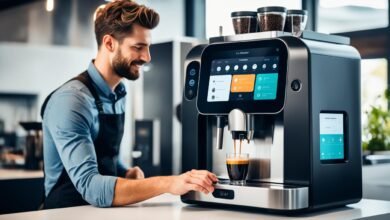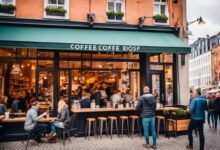The Role of Coffee Shops in Building Communities
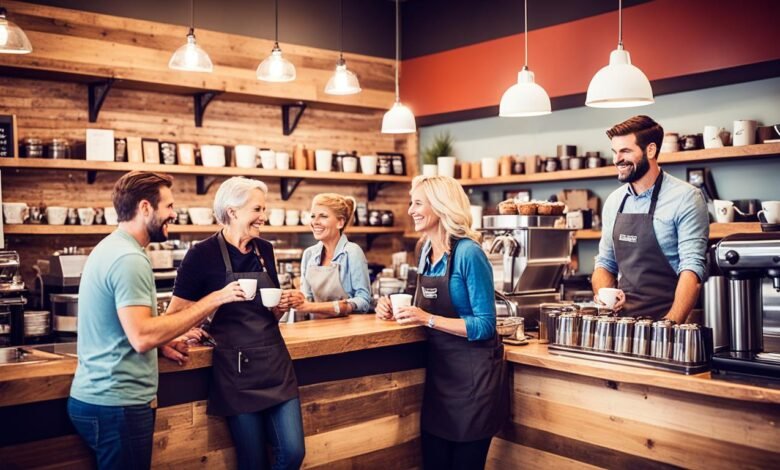
Imagine walking down a busy street and smelling fresh coffee. It pulls you into a cozy café. Inside, you meet warm baristas and hear friendly chats. It’s more than a spot for coffee; it’s where people from different backgrounds meet, work, and feel at home.
Coffee shops are the heart of many communities. They’re where locals and visitors meet. It’s not just about great coffee or art. It’s about building community, supporting local businesses, and sharing culture.
In our tech-filled world, coffee shops are a break from screens. They’re where you can meet others, work, or study. They welcome everyone, making you feel like you belong.
Key Takeaways
- Coffee shops are key spots for community, helping local economies and building social ties.
- The third wave coffee movement changed coffee culture, focusing on sustainability and direct trade.
- These shops offer a cozy spot for many activities, like chatting, book clubs, music, and art.
- Baristas make these places welcoming, helping customers feel loyal.
- Shops that meet customer needs, use technology, and focus on sustainability will stay important in the community.
Introduction: Coffee Shops as Community Hubs
Coffee shops are now key spots for community and connection, bringing folks together in our digital age. Coffee culture is more than a morning boost; it’s a social movement that’s grown over time. The third wave coffee movement has changed coffee culture, focusing on single beans, direct trade, and sustainability.
The Importance of Coffee Culture
Coffee shops have always been key places for people to meet and talk. Sociologist Ray Oldenburg calls them “third places.” These are spots that help build community outside of home and work.
The Evolution of Coffee Culture
The specialty coffee world has grown a lot, focusing on quality, being green, and community. Now, coffee shops host events like live music and book clubs. These events help people meet and connect deeply. By working with local groups and supporting causes, these places become centers for social connections and neighborhood gathering.
| Metric | Impact |
|---|---|
| Increase in customer interactions by redesigning space | 60-80% |
| Increase in foot traffic and community engagement from hosting events | 25-40% |
| Increase in revenue from shelving local products and collaborating with artists | 35-50% |
| Growth in user engagement and discussions on online communities | 50% |
| Increase in customer loyalty and brand reputation from supporting social causes | 30-45% |
As we spend more time online, the role of coffee shops as community hubs will only get bigger. They offer real-life chats and a feeling of belonging that online spaces can’t match.
Creating Community Spaces
Coffee shops are more than spots for a quick coffee. They’ve turned into lively community spaces that encourage socializing, networking, and relationship building. Their friendly vibe is ideal for starting chats, having deep talks, and meeting others with similar interests.
Now, many coffee shops host various activities and events. These include open mic nights, poetry workshops, and even sing-alongs for kids. Such events make these places centers for community engagement and personal growth. Customers can share interests, try new things, and make strong bonds in their favorite café.
“The rise of the coffee community in Indianapolis has coincided with the city’s development as a food-and-beverage destination. Hubbard and Cravens was the first coffee shop in Indianapolis to establish a rigorous training program for baristas alongside general coffee education.”
In recent years, the coffee community has changed a lot, especially in the Midwest. Coffee spots are no longer just for getting coffee. They’ve become places that connect people and make them feel like they belong.
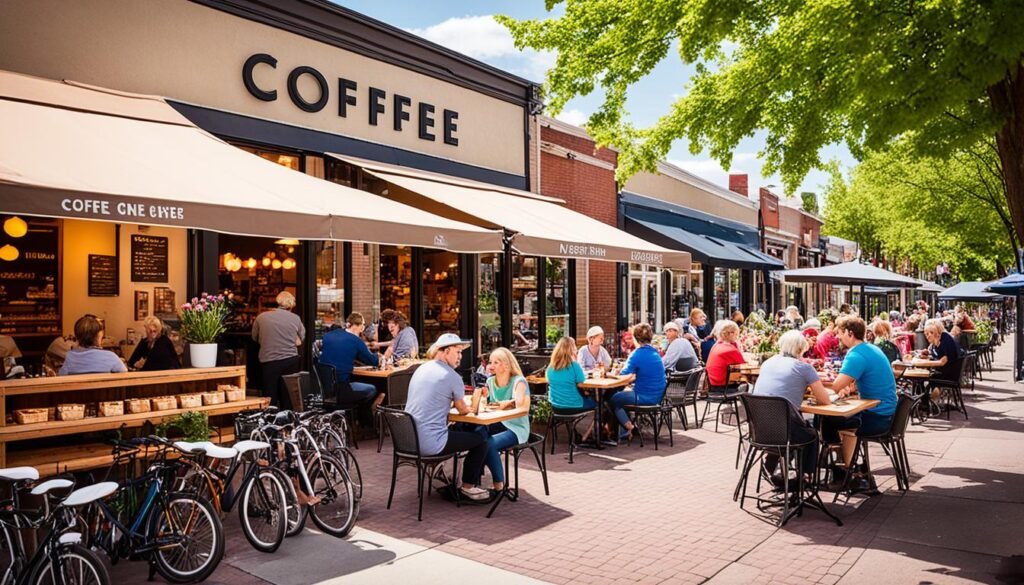
The community-centered approach of many coffee shops has deeply impacted their neighborhoods. By hosting events, backing local businesses, and engaging with customers, these cafes have become key parts of their communities. They help make the area more lively and support relationship building.
Coffee Shops as Co-Working Spaces
Coffee shops are more than just places to hang out anymore. They’re now a go-to spot for remote workers, freelancers, and entrepreneurs. With free WiFi, comfy seating, and a chill vibe, they’re perfect for those needing a co-working space.
Community Space Benefits
Using coffee shops as co-working spots has many perks. They offer a collaborative environment where people can meet, share ideas, and maybe even find new business partners. Plus, there’s a variety of seating for everyone, from cozy spots to big tables, building a strong community vibe.
Community Space Ideas
- Hosting events like book clubs, live music, and game nights makes the co-working space experience better.
- Working with local businesses for workshops, seminars, or networking can make a thriving scene for remote workers and entrepreneurs.
- Having private areas for meetings or video calls adds privacy and a touch of professionalism to the co-working space.
As more people seek flexible and remote work options, coffee shops are stepping up as dynamic co-working spaces. They mix the cozy feel of a café with the work-focused vibe of a modern office.

“The combination of a cafe/cafeteria and coworking space will be implemented at Junction440 in Detroit.”
| Coffee Shop Co-Working Spaces | Coworking Spaces |
|---|---|
| Offer a relaxed and casual atmosphere | Designed with productivity in mind |
| Provide free WiFi and electrical outlets | Offer high-speed internet and dedicated workstations |
| Cater to various seating preferences | Provide a range of private and collaborative areas |
| Often host community-building events | Organize social and networking events for members |
The Art of Socializing Over Coffee
Coffee shops are perfect for making social connections and building relationships. They offer a cozy and welcoming place for chatting and meeting new people. It’s easy to start conversations with both friends and strangers in these settings.
Ordering and enjoying coffee together can lead to deeper talks. People often share their thoughts on coffee or the latest news. This makes coffee shops great for connecting over a shared love for coffee.
Coffee shops are more than just places to grab a drink. They’re ideal for building relationships on purpose. Professionals might meet here for casual meetings. Friends and family use it to catch up and grow closer. These spaces are flexible and meet many social needs.
“The coffee shop is a place where conversations flourish, ideas are sparked, and relationships are forged. It’s a hub of social activity that transcends the simple act of enjoying a cup of coffee.”
Next time you’re in a coffee shop, take the chance to talk to others. Talk to the barista, chat with someone sitting next to you, or just enjoy the lively atmosphere. Doing this makes your visit better and helps build the coffee shop community.
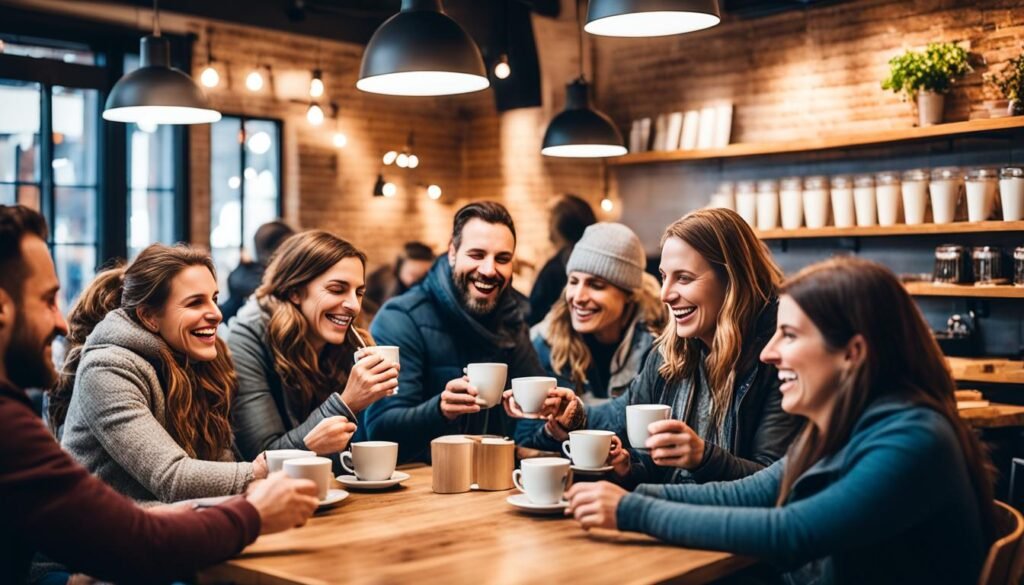
| Benefits of Socializing in Coffee Shops | Examples of Conversation Starters |
|---|---|
|
|
The Café Culture Experience
Café culture has grown a lot in recent years. Now, cafes are warm places where people can talk and make new friends. They are all about sharing coffee and connecting with others from different backgrounds.
Back in the 17th century, coffeehouses were like “penny universities” where people talked about big ideas. Today, cafes are buzzing with activity, bringing people together for community bonding and shared experiences.
From Turkey’s rich coffee to South Korea’s stylish cafes, the café culture knows no borders. It’s a global way for people to meet, share stories, and take a break from daily life.
Nowadays, cafes offer something for everyone, mixing casual spots with more elegant places. But they all share a goal: to create a friendly space for community and meaningful shared experiences.
“The smell of freshly brewed coffee, the gentle murmur of conversation, and the sense of belonging – that’s the essence of the café culture experience.”
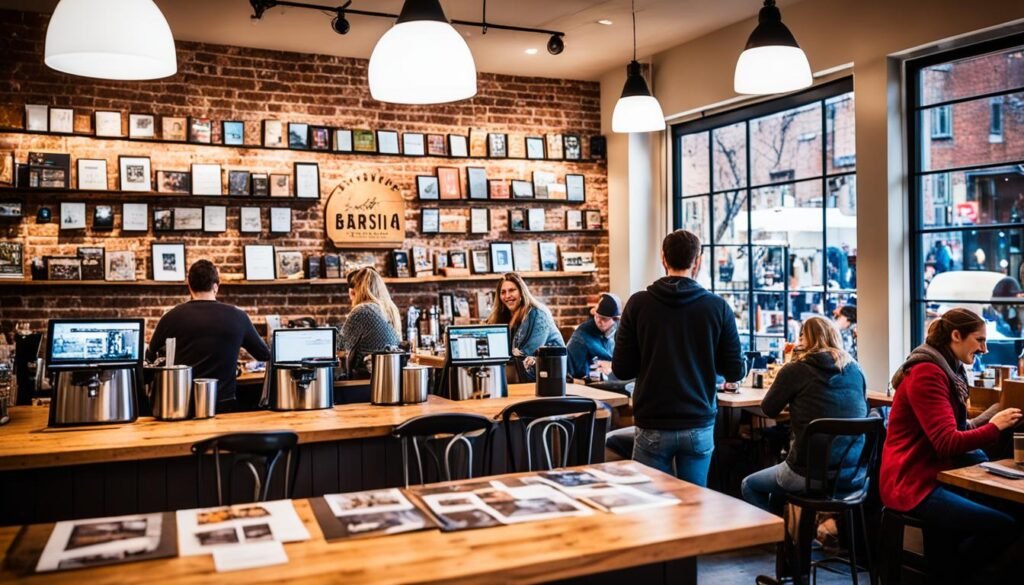
The café culture keeps changing but its core remains the same. Coffee’s power to unite people, build community bonding, and create shared experiences is timeless. It touches the lives of individuals and communities in a big way.
Coffee and Community
Coffee shops are key spots for community connections. They bring people together over their love for coffee. These small businesses help local communities grow and thrive. They also boost the local economy and help other neighborhood businesses.
These shops create a friendly place for people to meet and feel like they belong. Customers get to enjoy great coffee and talk with their neighbors. They can share ideas and work on projects together.
Coffee shops also help make neighborhoods better. When they do well, they draw in more money. This leads to more services and shops that make life better for locals.
“Coffee shops are the heartbeat of a community, bringing people together and fostering a sense of belonging that is so essential for a vibrant and connected neighborhood.”
Supporting local coffee shops helps strengthen community connections. It also boosts the local economy and helps improve your neighborhood. Whether you visit often or are new, your support can really change your community for the better.
Coffee Shops as Meeting Places
Coffee shops are key spots where people from different backgrounds meet to chat, network, and make friends. They offer a relaxed vibe that makes talking easy and helps people feel part of a group. In fact, a big 62% of people like to meet up at coffee shops for social times.
Aspects of Café Culture
Coffee culture is all about making connections. Baristas make these places welcoming and friendly. Sharing a coffee starts conversations. Studies say people who go to coffee shops often make about 7 new friends each month.
Coffee shops are also places where communities grow. A lot of locals, 48%, meet and talk at their neighborhood coffee spots. Supporting local shops helps the local economy a lot, adding 30% more money.
The third wave coffee movement has changed coffee culture a lot. It focuses more on the quality and art of making coffee. This has made coffee shops even more popular for people to meet and share their love for good coffee.
| Statistic | Value |
|---|---|
| Percentage of individuals who prefer meeting at a coffee shop for social interactions | 62% |
| Ratio of friendships initiated in coffee shops leading to long-term relationships | 3 out of 5 |
| Average number of new connections made per month by individuals who frequent coffee shops | 7 |
| Percentage of local community members who engage in coffee shop social interactions | 48% |
| Comparative increase in economic support when choosing local coffee shops over chain establishments | 30% |
Coffee shops are still popular for making friends and building communities, even with all the digital ways we connect now. They offer a cozy and neutral spot for deep talks, new friendships, and stronger community ties.
The Incremental Revival of Neighborhoods
Coffee shops are key to bringing life back to Neighborhood Revival and Downtown Revitalization. They come in various forms and don’t need a lot of money to start. This makes them a great way to slowly bring an area back to life after years of being quiet. A coffee shop can draw in more people and businesses, helping to revive a community.
In the last three years, places like Utica Coffee Roasting have been crucial in making cities like Utica, Schenectady, Rochester, and Geneva come alive again. Using coffee shops and cafes to spark Neighborhood Revival is all about growing little by little. This approach is favored by city planners.
Coffee shops are easy to start and don’t cost a lot upfront. They also let customers pay in flexible ways. When neighborhoods add local coffee shops, they see more people hanging out, social events, and money coming in.
The news about Cooperccino’s coffee house opening in Downtown Rome is a big step forward for the area. Local Business owners team up with local bakers to offer drinks and treats. This creates a cozy, community feel for customers.
“The simplicity of the coffee shop concept is emphasized as having a substantial impact on the incremental revival of neighborhoods, downtown areas, and urban spirits.”
Coffee shops have a big effect on Neighborhood Revival and Downtown Revitalization. For example, visiting a place like Java’s in Rochester changes how people see cities. It makes them want to see cities thrive and communities grow.
Coffee shops play a huge part in making neighborhoods and downtowns come back to life. They draw in more people and businesses. They also help build community spirit and boost the local economy.
Personal Experiences: Coffee Shops and Urban Connections
Coffee shops have changed how people connect and experience their cities. For many, visiting a local coffee shop as a teen was a turning point. It opened their eyes to their city’s potential and sparked a love for its growth. The coffee shop has grown from a spot for a quick coffee to a place where people make and keep connections.
As coffee culture changed from sit-in to drive-thru, the memories of coffee shops became more precious. Places like the Blackbird Cafe, founded in 2009, have become community centers. They offer a space for personal stories and help build urban bonds.
“Blackbird Cafe owner, Dan Cook, emphasizes face-to-face interactions as a core value, recognizing the importance of genuine connections with customers in building loyalty and a thriving community.”
During the COVID-19 pandemic, people turned to home-brewed coffee, missing their favorite coffee spots. This showed how important these places are. Meeting over coffee can create deep connections and help neighborhoods come back to life.
| Statistic | Value |
|---|---|
| First Starbucks store opened | 1971 in Seattle |
| Blackbird Cafe founded | 2009 |
| Blackbird Cafe is the longest-running cafe in Valparaiso | True |
The coffee shop is now key to city life, offering a place for community and personal stories. It’s where people meet and share, going beyond just buying coffee. As cities change, the lasting bonds formed over coffee show the power of these places.
The Simple Concept with a Big Impact
Coffee shops are more than spots for a quick coffee. They are centers of community, connection, and renewal. The idea of a coffee shop – offering coffee and a friendly vibe – deeply affects neighborhoods and communities.
These small businesses help start conversations and build community. They are key to creating “ecological civilizations” and “compassionate communities.” Third wave coffee shops, like Nexus Coffee and Creative, focus on being socially responsible, community-focused, and creative. They offer unique experiences that are more than just about coffee.
Local partners like Leiva’s Coffee and Round Mountain Coffee support community projects. They give customers unique coffee experiences that unite people. Nexus Coffee and Creative aims to be a place where creativity thrives. They offer different seating and creative rooms for rent.
Coffee can help improve focus and mental alertness. It can also help people connect more openly and creatively. Coffee is a common language that breaks down social barriers. It helps people connect and engage with their communities.
The way we pay attention to coffee is key to improving our spiritual experiences and connections. Coffee can unite people from different backgrounds, including those without a religious affiliation. This simple idea of a coffee shop can deeply impact neighborhoods and communities. It acts as a center for building community, supporting local economies, and offering a place for people to meet and socialize.
“Coffee shops are more than just places to grab a quick caffeine fix; they are hubs of community, connection, and revitalization.”
Conclusion
Coffee shops are key to building strong communities across the U.S. They offer a place for people to meet, work, and relax. This helps the local economy and supports other businesses nearby.
Coffee culture and the café experience bring people together. They help build relationships and a sense of community. These places can start the revival of neighborhoods, making a big difference in the city’s spirit.
Looking for a cozy spot to meet friends, a place to work with colleagues, or just a spot for a great coffee? These community hubs can make your day better and bring us closer together. So, when you visit your local coffee shop next, think about the big role it plays in our communities.



